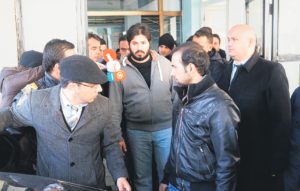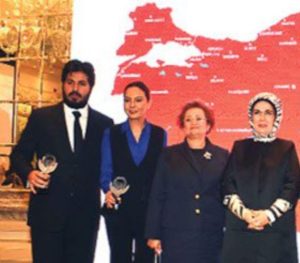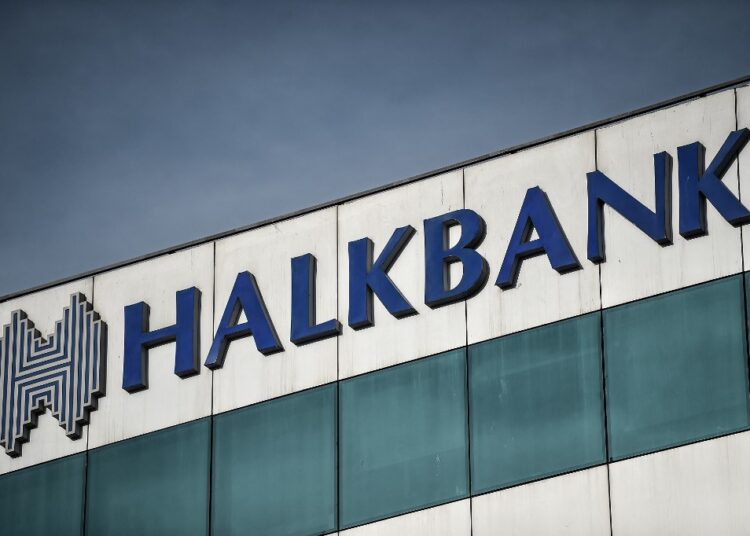Abdullah Bozkurt/Stockholm
The government of Turkish President Recep Tayyip Erdogan enlisted the help of Qatar, Pakistan and Azerbaijan in his unsuccessful bid to kill a criminal case in the US over his years-long secret scheme to launder money on behalf of the Iranian regime in exchange for bribes and kickbacks.
The Erdogan government’s legal fight to shield a Turkish state lender from criminal prosecution by US prosecutors that made its way to the US Supreme Court was unsuccessful despite pouring large amounts of money into law firms and the mobilization of its close state allies.
The Supreme Court ruled on April 19, 2023 that Halkbank, a Turkish state-owned bank that was involved in moving Iranian funds in various schemes, is not immune from criminal prosecution in the US. In the landmark ruling, which sets a precedent for trying sovereign entities in criminal cases in the US judicial system, the Supreme Court rejected Turkey’s defense that the bank has sovereign immunity from criminal liability under the Foreign Sovereign Immunities Act (FSIA), which was codified by Congress in 1976.
The case docket shows that Turkey managed to get close allies Qatar, Azerbaijan and Pakistan to submit a legal brief in its defense, to no avail.
US grand jury indictment of Turkish state lender Halkbank:
The brief submitted to the Supreme Court on behalf of these three countries on November 21, 2022 was prepared by Ayşe Yüksel Mahfoud, a US lawyer of Turkish origin at Norton Rose Fulbright (NRF), a British-American multinational law firm. The brief generally parroted talking points raised by Halkbank’s lawyers and warned that the trial of a Turkish bank could set a bad precedent and complicate US national security matters.
Yet neither Halkbank’s defense nor the briefs submitted on Turkey’s behalf by Qatar, Azerbaijan and Pakistan helped sway the supreme court justices against the US Justice Department, which defended the indictment of the bank by federal prosecutors in New York.
The Halkbank case originated in 2019, when a grand jury in the US indicted the bank on charges that it laundered some $20 billion on behalf of Iran in violation of US sanctions on the mullah regime between 2012 and 2016. A select group of Turkish officials including cabinet ministers, apparently with Erdogan’s approval, helped move Iranian oil and gas proceeds kept at Halkbank in a secret web of schemes that included fictitious trade and buying gold.
It was the largest known scheme to evade the US economic sanctions on Iran. The Erdogan government deliberately engaged in unlawful acts, and senior Turkish officials personally pocketed millions of dollars from the scheme. When confronted by US Treasury officials who warned against such practices at the time, Turkish officials also lied about their involvement and denied violating the US sanctions on Iran.
Brief filed by Qatar, Azerbaijan and Pakistan to support Halkbank’s appeal at the US Supreme Court:
The scheme involved Halkbank’s efforts to conceal the nature of its ties to Iranian operatives who used the Turkish and US financial systems to buy gold and move it to Dubai before finally reaching Iran. When the gold trade was also included in the sanctions regime, the suspects turned to the purchase of food and medicine by Iranian customers in order to appear to fall within the humanitarian exception to the sanctions.
In reality no such purchase ever occurred, appearing only on paper while Iranian handlers were busy moving funds through a number of shell companies in Turkey and the United Arab Emirates. At the center of it all was Turkish-Iranian operative Reza Zarrab, who gained access to Erdogan and his inner circle and bribed Turkish officials to make the scheme work with the help of Halkbank.
According to the indictment, Halkbank was charged with conspiring to defraud the US, bank fraud, money laundering and violating the International Emergency Economic Powers Act (IEEPA), which authorizes the US president to impose sanctions. Halkbank filed an appeal on August 10, 2020 saying that it is immune from criminal prosecution under FSIA because it is owned by the Turkish state. The US District Court for the Southern District of New York rejected Halkbank’s challenge of the indictment on October 1, 2020. On appeal, the US Court of Appeals for the Second Circuit upheld the district court’s ruling on October 22, 2021.
Halkbank filed an appeal with the US Supreme Court through its lawyers at Williams and Connolly LLP on May 13, 2022 primarily on the grounds that US laws do not allow the prosecution of sovereign powers in criminal matters. It said if US courts can convict foreign states, the US risks retaliatory actions around the world. It claimed federal prosecutors in Manhattan would have license to pursue friends and foes across the globe, violating the bedrock norms of international law.

In order to not stand alone against a barrage of charges leveled against Turkey, the Erdogan government mobilized its close allies. It convinced Azerbaijan and Pakistan to file amicus briefs on Turkey’s behalf on June 16, 2022 to support the appeal despite the fact that neither of these countries was party to the case. A newer version of the brief was filed on November 21, 2022, with Qatar throwing its support behind Turkey along with Azerbaijan and Pakistan.
In both briefs, lawyer Mahfoud argued that if the US can prosecute Halkbank and Turkey as alleged criminals, then it can also criminally prosecute Azerbaijan, Qatar and Pakistan, or any other sovereign state. “That result would be unprecedented in world history and make the US an extreme outlier in the international community,” the lawyer contended, warning that it could spark serious diplomatic recrimination and retaliation against the US.
In a bizarre move in the case, the Erdogan government also enlisted the Turkish Red Crescent (Kızılay), the government-controlled charity and humanitarian organization, to file a brief to defend its position at the US Supreme Court on November 21, 2022. The brief, filed by law firm Baker & Hostetler LLP, claimed that once the US rejects the equal dignity of sovereigns, the many international norms and systems that depend on the cooperation it facilitates will be threatened, including the system of international humanitarian aid. In other words, the Red Crescent maintained that it would suffer from the US prosecuting Halkbank, an instrument of a sovereign power Turkey.
Kızılay was at the center of controversy in recent months for selling tents, blood supplies and second-hand items rather than donating them to the victims of earthquakes that claimed the lives of more than 50,000 people in Turkey’s southern and southeastern provinces. The failure to quickly mobilize enough relief supplies after the earthquakes, which struck on February 6, Kızılay was criticized by the political opposition in Turkey, which also accused it of acting like a for-profit company with its 11 subsidiaries, 11 general directors, CEO and large staff of Erdogan loyalists.
Brief submitted to the US Supreme Court by the Turkish Red Crescent, TOBB and TBB to support Halkbank’s appeal:
In Mahfoud’s brief, the Turkish Union of Chambers and Commodity Exchanges (Türkiye Odalar ve Borsalar Birliği, TOBB), a national confederation of all local chambers of commerce and commodity exchanges in Turkey, and the Banks Association of Turkey (Türkiye Bankalar Birliği, TBB), a professional organization, both of which are under the indirect control of the Turkish government, were also listed as petitioners to support Halkbank’s appeal. Mahfoud claimed that private entities would suffer from the prosecution of Halkbank in the US and argued that the prosecution would have a chilling effect on private entities and would deter investment, trade and commerce to the detriment of the US and global economies.
On the same day Saltman & Evinch, PLLC, a law firm registered with the US Justice Department as a lobbyist for the Turkish government under the Foreign Agent Registration Act (FARA), also filed a brief to support the Erdoğan government. The firm included a number of statements on how Turkey and the US have long been strategic allies, enjoy bilateral trade and work together on many global issues. The brief was meant to make clear that Halkbank is an integral part of the Turkish government and as such enjoys sovereign immunity.
The FARA filings made by Saltman & Evinch show that it received $1,125,824 from the Turkish government for legal services rendered between July and December 2022. The filings mention the firm’s work at the US Supreme Court on Turkey’s behalf.

The US government defended the prosecution during the hearing at the Supreme Court and underlined that the case does not involve the prosecution of a sovereign government. It said the US has been pursuing criminal matters against foreign government-owned companies — if not foreign states themselves — for at least 70 years.
A Justice Department lawyer told the court in January 2023 that a ruling for Halkbank could allow any foreign state-owned enterprise to “become a clearinghouse for any federal crime, including interfering in our elections, stealing our nuclear secrets, or something like here, evading our sanctions and funneling billions of dollars to an embargoed nation.”
Zarrab and his Turkish and Iranian associates were detained on December 17, 2013 on multiple charges including paying bribes to senior government officials as part of a multi-year investigation by prosecutors in Istanbul. However, the Erdogan government intervened in the case, removed the investigating prosecutors and police chiefs who exposed Zarrab’s corrupt network moving Iranian funds out of Turkey. Erdogan saved Zarrab from legal troubles and secured his release from detention.
The case was later dismissed by the new loyalist prosecutors who took over the case, and the prosecutors and police chief who uncovered Zarrab’s illegal network were punished by the Erdogan government. Many of them were imprisoned on fabricated charges. Yakup Saygılı, a veteran police chief who led the Financial Crimes Unit at the Istanbul police department, was the chief investigator into Zarrab’s activities. He remains in prison for doing his job as of the present day.
US Supreme Court decision on the Halkbank case:
However, Zarrab was indicted by federal prosecutors in the Southern District of New York in 2015 after his arrest in Miami by the FBI. The government also indicted three former Halkbank executives and former Turkish Economy Minister Mehmet Zafer Çağlayan on multiple charges. In 2017 Zarrab pleaded guilty, turned government witness and revealed the entire corrupt scheme he had set up in Turkey, UAE and Iran. The case went to trial, and Mehmet Hakan Atilla, deputy manager of Halkbank at the time, was convicted and sentenced to prison.
Although the Supreme Court rejected Turkey’s main defense that the bank is protected from criminal prosecution under FSIA, it gave some breathing room to Turkey to drag out the legal challenge by tossing out the ruling of the US Court of Appeals for the Second Circuit, which stated that the bank has no foreign sovereign immunity under common law, either. The Supreme Court ordered the Court of Appeals to reconsider Halkbank’s effort to dismiss the case under the common law argument.
The bank is not expected to win the challenge under common law, either, but this would help defer the case and benefit the Erdogan government politically for the elections in May. The case may again end up in the Supreme Court if Turkey decides to challenge the legality of the prosecution under common law and the Supreme Court agrees to hear the case after the federal appeals court revisits it. When all legal challenges are exhausted and Turkey’s legal challenges are rejected, a trial is set to resume at a federal court in New York.












